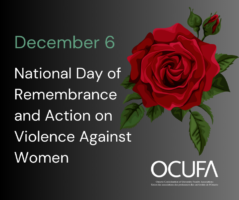Ending gender-based violence on our campuses and in our communities
By: Nigmendra Narain, OCUFA President

December 6 marks 34 years since the deadly misogynistic massacre of 14 women engineering students at L’Ecole Polytechnique in Montreal. December 6th is now known as National Day of Remembrance and Action on Violence Against Women, and every year we remember the 14 women killed in Montreal and recommit to ending gender-based violence on our campuses and in our communities.
In June 2023, we saw again just how urgent that mission is on our campuses. A person explicitly targeted a gender studies class on the campus of the University of Waterloo for a violent attack, wounding two students and a professor. The attack was shocking and deeply traumatizing for the victims, their families, their colleagues, and the entire Waterloo community. It resonated with so many across campuses and communities in Canada and beyond as well. Importantly, the incident was a sad reminder of the ongoing necessity to address misogyny, transphobia, and sexuality and gender-based violence in our campus communities.
Three decades after the L’Ecole Polytechnique massacre, more must be done to redress gender-based violence on campus and the increasing threats and harassment experienced by faculty, academic librarians, staff, and students who are marginalized, and who work in the areas of, but not limited to, gender, sexuality, race and racism, Indigenous, and Black studies.
Following the horrific attack in June, the Women’s and Gender Studies et Recherches Féministes (WGSRF) published an open statement, as well as a follow-up set of recommendations for universities and colleges to ensure safety on campuses. Crucially, the group recommends that postsecondary institutions “work collaboratively with faculty, front-line staff, and student leaders, to create meaningful responses to the increasing threats of violence and harm on our campuses” using non-carceral, trauma-informed approaches.
OCUFA strongly supports these recommendations. Many faculty associations in Ontario have been working for years to improve safety measures and educate campus communities about gender-based violence and harassment. Faculty and staff associations and unions are key partners for universities in this pursuit, and university leadership should work with them in strong, meaningful, and collaborative ways to find solutions to these pressing and urgent challenges.
The provincial government has a role to play here as well. The government can and should do a great deal more to assist universities with expanding trauma-informed, non-carceral, and meaningful safety measures. More direct, per-student funding for our public universities is a necessary sustainable, robust method for addressing some of these concerns along with consultation of faculty associations, staff unions, and student groups for impactful and effective actions. The government’s current Campus Safety Grant provides only about $120,000 in funding per university or college in Ontario to develop these safety measures—but this is barely a drop in the bucket to help make campuses safer.
This December 6, we honour Genevieve Bergeron, Helene Colgan, Nathalie Croteau, Barbara Daigneault, Anne-Marie Edward, Maud Haviernick, Barbara Klucznik-Widajewicz, Maryse Laganiere, Maryse Leclair, Anne-Marie Lemay, Sonia Pelletier, Michele Richard, Annie St-Arneault and Annie Turcotte, by reaffirming our ongoing commitment to ending gender-based violence and harassment at Ontario universities.

